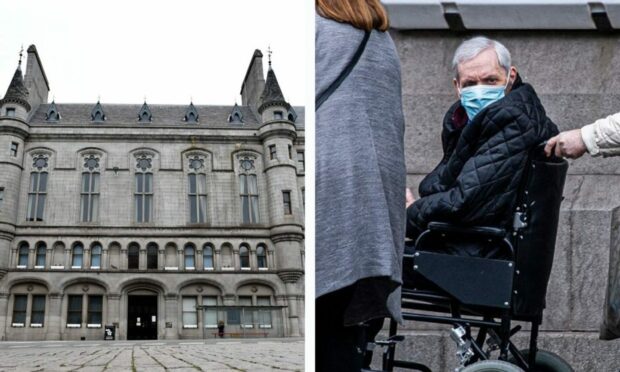A £300,000 tax-dodger who is too sick to be jailed will probably have to make woodwork projects from home as punishment instead, the Press and Journal can reveal.
Fish firm boss Raymond Esslemont avoided prison when his lawyer pleaded with a sheriff to show the “very unwell” criminal “compassion”.
The 71-year-old, who is “wholly reliant” on his wife and daughter for personal care, held onto £295,599.97 in taxes that he “never got around” to paying the government.
The “all but bed-bound” – and now bankrupt businessman – was handed 300 hours of unpaid work by Sheriff Morag McLaughlin, who said she had made the decision after “a lot of anxious thought”.
But with Esslemont’s health set to “decline and deteriorate”, questions have been raised about how the “housebound” wheelchair user will be able to carry out his punishment.
Readers of The Press and Journal took to social media to comment on the sentence.
Questioning how 300 hours of unpaid work would make up for the money Esslemont withheld from the taxman, reader Victor Beattie asked: “What kind of work is worth £1,000 an hour?”
Sonya Innes also posted on Facebook: “And how is that going to work? He’s bed-bound and too ill for jail. But fit enough for unpaid work?”
Margaret Scott said the punishment “doesn’t make sense” and Karen Elizabeth queried: “Unpaid work? Doing what exactly?”
Stanley Moore was among them, also asking: “How the hell is he going to do that work if he is near bedbound?”
‘Light seated’ duties
According to Aberdeen City Council, offenders sentenced to unpaid work can expect to be assigned supervised activities that include litter picking, gardening or clearing snow.
Other tasks, to repay local communities for the harm caused by criminals, involve maintaining community walkways, public routes and cycle paths.
And community painting and environmental projects are also available.
However, Esslemont is likely to be allowed to avoid the heavy outdoor work and instead swap it for “light seated” duties, potentially in his own home.
He will probably be given woodwork tasks involving small wooden plaques that can be painted, stencilled and varnished.
They could be turned into labels for community vegetable gardens, floor games for schools and nurseries, or key and dog lead holders.
The recycled woodcuts can also be turned into plaques for cat and dog homes or “motivational signs” for dog litter pick-up points, green spaces and parks.
‘Tasks could be provided at home’
A spokesman for Aberdeen City Health and Social Care Partnership told the Press and Journal that offenders like Esslemont could carry out unpaid work sentences from home.
He explained: “If an individual can provide medical confirmation of their condition -either acute or chronic – rather than heavy outdoor work we can provide light seated joinery duties in our indoor workshop.
“Our workshop is on the ground floor and has appropriate disabled toilet facilities and easy access for anyone who uses a wheelchair.
“The small joinery products we produce are then donated to nurseries, schools or community gardens for use within the local community.
“If someone is housebound and cannot transport themselves to our workshop then, once medical confirmation of this is available, tasks could be provided at home.”
Esslemont was arrested at his business premises on February 28 2019, when he told police officers: “I’m a disaster. A walking disaster”.
He later admitted to two charges of being knowingly concerned in the fraudulent evasion of income tax.
He also pled guilty to two charges of being knowingly concerned in the fraudulent evasion of paying national insurance contributions.
‘Very poor compliance history’
Fiscal depute Tom Procter previously told Aberdeen Sheriff Court that Esslemont and his wife Ilene had been involved in the city’s fish processing and smoking industry since at least the 1990s.
Between January 1 2006 and August 5 2011, his wife, on paper, was the sole director of Red MacGregor Smoked Salmon, however, in reality, Esslemont was “heavily involved” in the day-to-day running.
From August 5 2011 to April 5 2019, Esslemont had sole responsibility for the business, which was also known as Raysalmon, as a sole trader.
Mr Procter said: “Raymond Esslemont has a very poor compliance history with HMRC, which provides the context to these offences.
“In September 2013, HMRC petitioned for sequestration. The Esslemonts were declared bankrupt in October 2013, their house was subsequently sold and HMRC received a repayment of £27,440.33.”
HMRC commenced an investigation into the offences following contact from the Aberdeen Citizens Advice Bureau, which had heard from a woman who had worked for Esslemont for 10 years.
The case was later referred for a criminal investigation.
‘Decision-making was disastrous’
Esslemont’s defence agent Liam Mcallister told the court: “He takes full responsibility for his decision-making which was, quite frankly, disastrous.”
At his client’s sentencing, Mr Mcallister told Sheriff McLaughlin: “The court has to punish Mr Esslemont for his outrageous decision-making over the years, for his burying his head in the sand and for the position he’s placed his wife and family in.
“He has to live with that, but there has to be, I’d submit, a degree of compassion.
“It’s not often I can stand before the court and say sending someone to prison is the equivalent of a death sentence, and I’m not saying that today, but he is chronic and is going to get worse.”
‘Due regard can be paid to disability’
Part of Esslemont’s sentence includes a requirement for the pensioner to be supervised for three years.
The sheriff also imposed a 12-month curfew on top of an order for Esslemont, of Margaret Place in Aberdeen, to do 300 hours of unpaid work.
A Scottish Government spokeswoman said: “Once a Community Payback Order has been imposed, the management of that order is a matter for the court and local authority justice social work services.
“If an unpaid or other activity requirement is imposed, justice social work should assess the individual and have regard to their circumstances, needs, and risks when considering available work placements, with medical input where appropriate.
“National guidance notes that unpaid work schemes should make placements available across a wide range of work settings and types of activity, so that due regard can be paid to disability, age and other individual factors.”
For all the latest court cases in Aberdeen as well as crime and breaking incidents, join our Facebook group.


